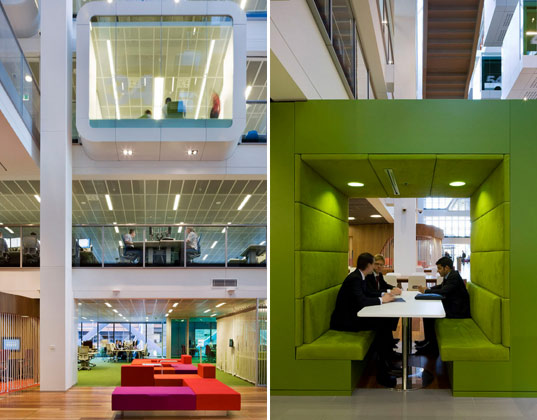Architect and economist, Mischa Schlemmer, was introduced to coworking while she was working on her Masters Degree. The focus of Mischa’s research was economic development of creative clusters at the LSE, which stayed with her as she moved on to ultimately work on building up Google’s Paris office.
Since then, Mischa has become a notable expert on the role of technology in today’s workplace, taking into account the rise of remote workers, globalization and a need for a better work/life balance. Currently, she is focused on helping conscious community leaders attract, engage and maintain optimal creativity and collaboration through emotional intelligence, peak performance and flow state.
Hi, Mischa. Can you please tell us about the role coworking has played throughout your career?
When I was building Google’s office in Paris, I reflected on their approach to building their own private creative cluster, aka Googleplex. Complete with all the perks and amenities to attract, engage and retain the best and brightest “smart creatives” as CEO Erick Schmit calls them, I recognized a lot of similarities between these creative clusters and the overall coworking philosophy and practices. I also noticed that Google was drawing on the same creative engagement and community building approaches that I had originally experienced in my “studio” shared workspace while in architecture school.
I began talking to my real-estate development colleagues and friends about coworking as it became a fast evolving trend, acting as a catalyst for more flexible relationships between office space operators and workers. This led me to become fascinated by the intersection of coworking’s bottom up approach, user generated solutions that compliment and contrast with the corporate top-down model, as well as hybrid models for nurturing creativity and collaboration.
As you are interested in how globalization influences workplaces, what are some of the ways that a global workforce has inspired the future of work movement?
With the introduction of more open communication channels, producers (entrepreneurs) who need support to bring their product or service to market can now easily connect to investors and venture capital who seek to invest their gains back into the market, which is ultimately driving the “start up” business model.
For the global workforce, there is a greater need for emotional intelligence and intercultural awareness, as well as harboring more sensitivity and diplomacy as a way to understand the needs, wants and expectations of diverse consumers, workers, investors, and governments around the world.
How has coworking, as a global movement, influenced real estate?
In regards to commercial office real estate, the relationship between landlords and tenants has changed. The shift towards “startup” business culture means that companies are created to test market demands, and they are subsequently not willing to carry the financial or operational risk as well as the demand for long-term leases.
The financial crisis led to tightening up of overhead budgets across the corporate sector and today an increasing amount of companies are exploring more flexible workspace agreements and provisions for their employees to attract, retain and engage talent/workers. Overall, contemporary businesses need flexibility and outsourced pay-as-you-go services and support.

Mischa Schlemmer
The coworking model translated into space as a service model is highly flexible and customizable. In the past, landlords contracted with a company paid the end user to show up every day to occupy the workstation, but now the coworking model is more similar to a hotel where the space operator sells space as a service to end users who have specific expectations and demands. Developers, brokerages, and landlords need to understand this service and ultimately design for and accommodate the expanding diversity of needs and expectations of end users.
What are the challenges that real estate still faces today?
The biggest challenges faced by the real-estate sector today is keeping up and staying ahead of the radical changes that are constantly challenging longstanding expensive and heavily administrative traditional processes associated with the industry. The real estate sector is perhaps the last to be overhauled by the digital revolution due to the scale and permanence of the product. But, real estate will be revolutionized just like so many other industries, from music, health, financial, education, public service, agriculture, etc.
What can more corporate enterprises do to actually make room for innovation?
Listen! Listen! Listen! Build trusting open engaged communication within their communities and ask the community members (investors, leaders, workers, consumers, partners, etc) what they want and need. Also, make sure to ask exactly how they want to help contribute to the community. Set up clear agreements and buy-in about the vision and value of the community identity or brand. Use internal CRM (contact relationship management) to track and support each community member’s growth and evolution. Empower community members to participate and serve the community in a way that feels generative for them.
What would be the best steps to take to create an original model that actually fits your community?
Make it a priority and co-create a plan that enables regular practice and engagement.
In what ways can corporate companies use coworking values in a genuine way?
Focus on each community member as a cherished and special talent worth getting to know by unlocking their inner power of networks, creativity, and collaborative synergies. Create programming and personalized support to help each community member explore the edges of their comfort zone in a safe and supportive environment. Let go of control and focus on trust and empowerment.
What can the coworking industry do to maintain their values while also benefitting from financial partnerships with corporations?
Use the emotional intelligence skills of coworking operators to make sure you have connected and clear values while you build a vision of the community identity/ brand. Make sure you also take the time to co-create a mutually beneficial relationship agreement with a practice plan of how to grow the relationship of the partnership.
Finally, how can these workspace models of the future influence the way that we build and organize our cities? (In the way that we promote better living for all)
Workplaces are becoming a place that you choose to go to because it helps you access the full potential of your mind, body, and imagination. This fundamental shift in the way we relate work to salary slavery s towards a more supportive environment that caters to self-actualization of optimized unique individuals will have a profound impact on city design. For example, more specialized neighborhood creative clusters with clear communication of common values and vision to attract like-minded neighbors, and business.
We will see an increase in coworking and coliving models, as well as more organized opportunities to volunteer time and energy towards purposeful service that will be integrated into city life.



0 Comments